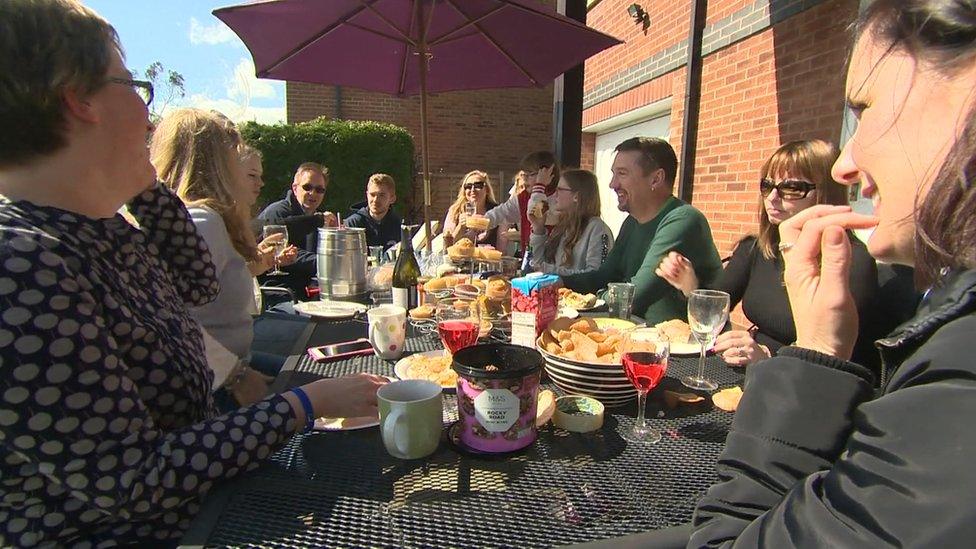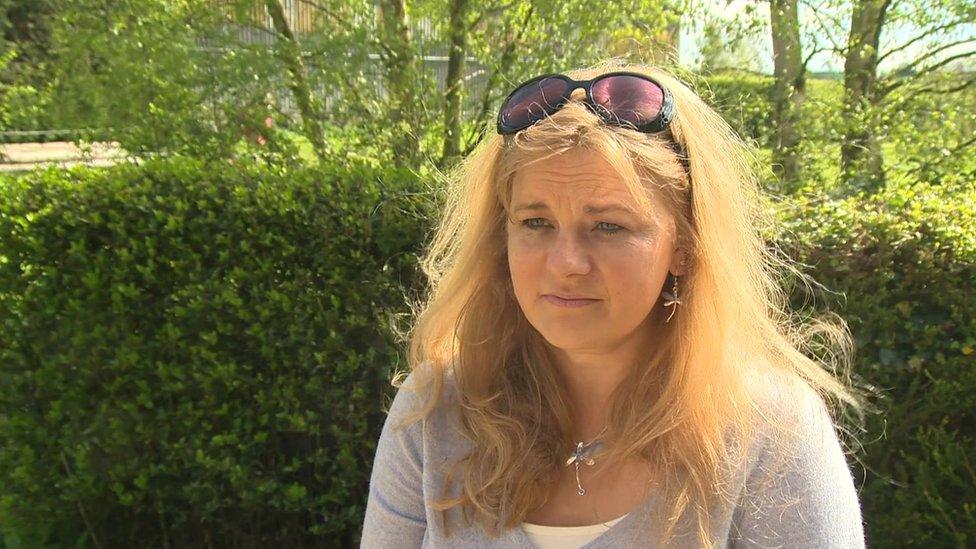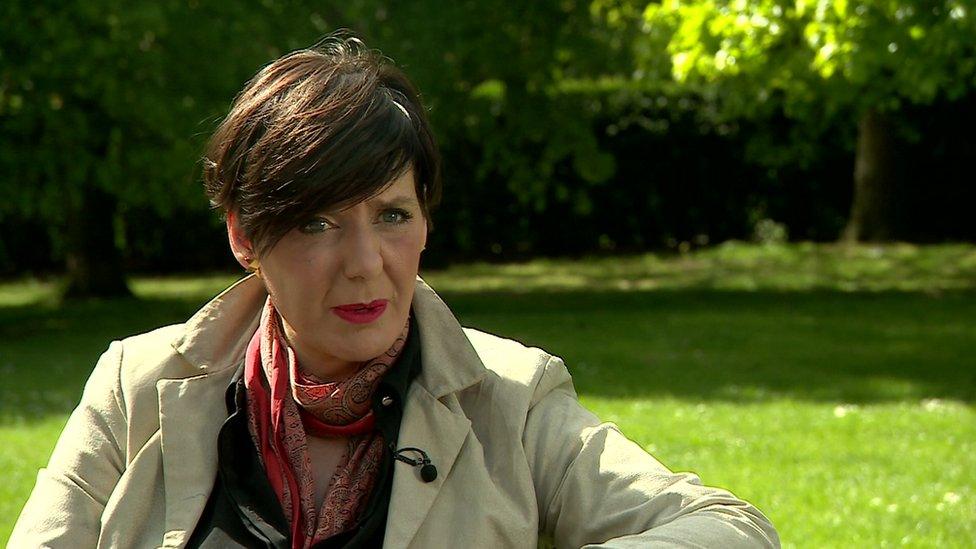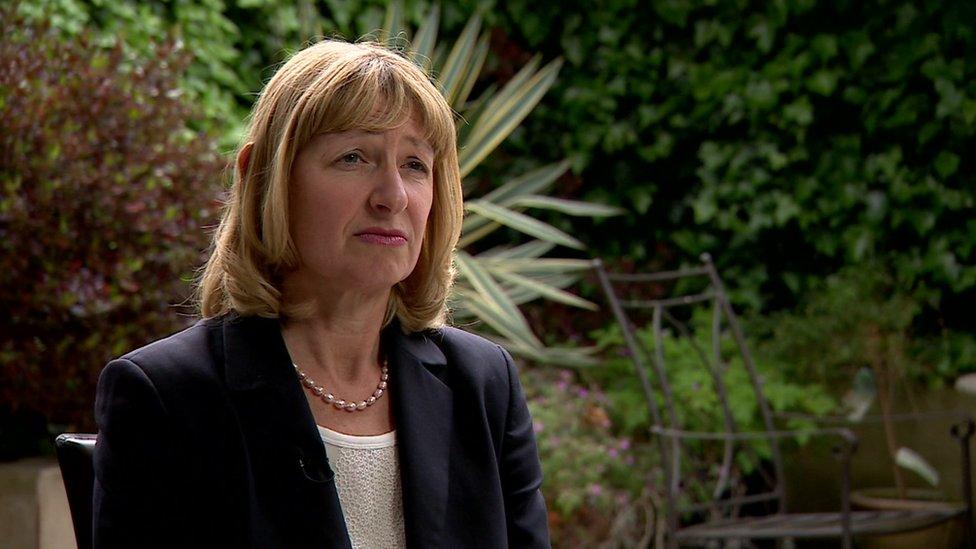'The grief can damage your mental health'
- Published

The group meets to provide mutual support
It is a sunny Saturday afternoon and sausages are sizzling on the barbecue, wine is flowing and children shuttle between the swings and a plate of cupcakes.
This gathering in Nottingham looks like any group of friends, but the adults have one thing in common - they have all been widowed.
Way: Widowed and Young, external is a peer support organisation, introducing people in similarly tragic situations to others who can understand their complex grief.
All the members present agree that its regular meetings and internet chatroom have been an essential part of coping in the days and years since their bereavements.
"When my husband first died, suddenly from meningitis, I couldn't be in the house on my own. I had panic attacks," says Georgia Elms, who is now chair of Way.

Georgia Elms was pregnant when her husband died
She was widowed 10 years ago and discovered she was pregnant with her second daughter the following day.
"It really does affect your mental health. You become a different person and your self-confidence goes," she adds.
"You think you're going mad when you're grieving. For me - and everybody grieves differently - I wanted to check that what I was feeling was normal. It made me feel a lot calmer, that everybody else felt the same way."
Mental health concerns are a common theme in the group.
"It's normal to feel a little bit crazy. You feel these hugely strong emotions and the kids do too," says Sarah Philips, another member of the group.
"If that's not handled well, you can end up being a bit crazy."
Kevin Moore lost his wife to breast cancer eight years ago and joined Way in order to meet other fathers in the same position.
"It's a very traumatic experience. It turns your whole world upside down. It certainly does affect your mental health overall," he says.
"There are some very dark times and it's very despairing at times when you don't know what happens next. Being able to share your concerns helps you move through those times together.
"It's not a medical condition you can go to the doctor's with."

Angela Sumata's husband took his own life
Being widowed at all is highly traumatic, but for Angela Sumata, whose husband Mark took his own life 13 years ago, her grief was almost impossible to process.
"Bereavement and grief is something that we all have to deal with in life. The thing that compounds it when somebody takes their life, is that it brings with it a whole different level of complexity, the emotions you feel, how they can change from day to day, hour to hour, minute to minute."
Angela joined Survivors of Bereavement by Suicide,, external another peer support organisation, in the wake of her experience.
"When Mark took his life we were very well treated on the night, but after that you're really reliant on your friends and family. What we didn't have was the offer of support from any professional.
"All of my help has come from the charity sector, from people realising that the specialist services aren't there and forming charities themselves."
It is especially important for people affected by suicide, says Angela, who is now a campaigner and fronted the BBC documentary Life After Suicide.
"There's people who consider suicide because they've been bereaved by suicide. If you don't receive the help you need to navigate through the issues, then absolutely it can lead to mental health issues."

Yvonne Tulloch said society was not geared up to help people who were suddenly bereaved
One of the biggest issues, according to former cathedral minister Yvonne Tulloch, is finding the support when you need it.
Her husband died suddenly nine years ago while on a business trip. She found her grief hard to contain and says she had suicidal thoughts herself.
"It's this massive sadness that comes over you and you just can't get out of that, and you feel like life just isn't worth living," she says.
"These days it feels like people just don't understand what you're going through, and society's not geared up to help.
"I spiralled down very rapidly and got to the point of beginning to think there's no point to my life any more. The thought of ending it began crossing my mind."
She has set up the website At A Loss,, external where users can search for the most suitable support, be it for the loss of a parent or partner, tailored to the individual's age.
"We are providing a one-stop shop website to help signpost the bereaved to support," she says.
"If you find somebody who's been through what you're going through, and has come out the other side, it gives you hope."